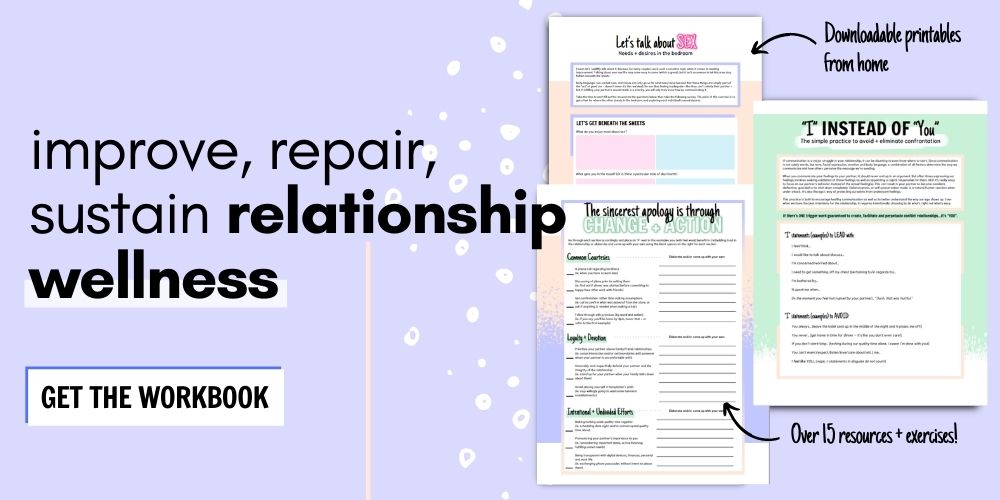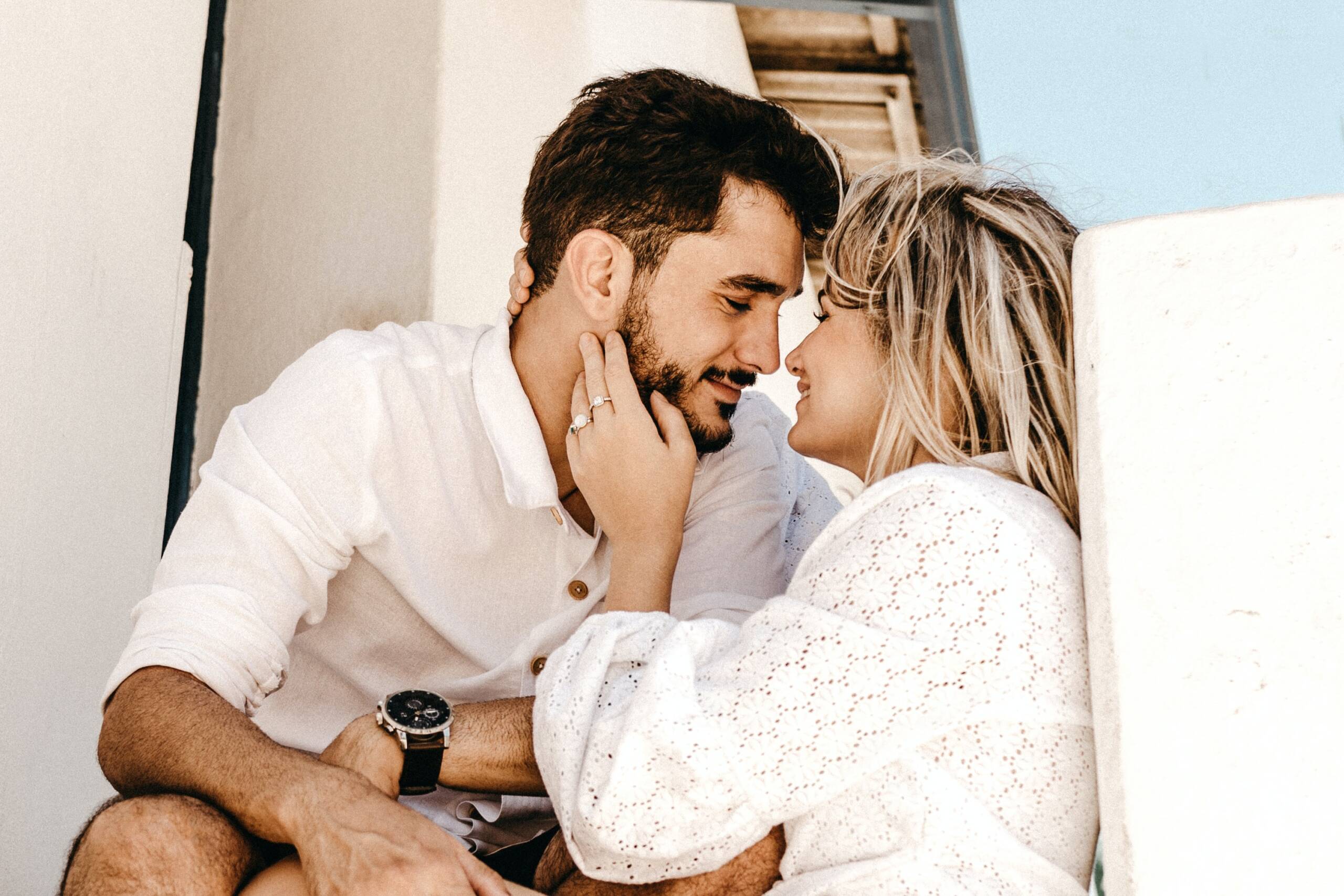Notice how easy it is to find content that is always circling red flags in relationships? Now I’m not saying they’re not important to watch out for, but if you’re nose-deep in seeing the bad you might be missing or looking over the good right in front of you!
Often times the red flags we think we see are actually within ourselves – this is also something important to note when addressing Green Flags in healthy, happy relationships. Therefore, do consider the vice versa of this list – not just what your partner provides for you, but also what you provide as a partner.
So buckle up, because there are 50 of these relationship green flags to unpack!

50 Green flags to look for in healthy, happy relationships
**Remember to consider the ‘vice versa’ of these points – they go both ways!
You feel safe and secure. Both with your partner, in the relationship, and within yourself, while the effort and reassurance in maintaining this sense of security are clearly prioritized.
You feel heard, seen, and accepted. As a partner AND an individual aside from the relationship. Both are mutually supported, validated, and respected.
You are attuned to each other’s needs. As you also feel the ease of expressing them. Attunement is practiced through the strengthening of an emotional connection, where there is a deep sense of high regard for the other as well as to meet their needs (to the best of one’s own ability).
You take responsibility for “filling your own cup”. There’s a mutual understanding that one person cannot and is not solely capable of fulfilling every individual need; holding one another accountable for self-fulfillment through support is a proactive goal.
You remember “the little things” or finer [yet important] details. Not just their birthday or phone number by heart. You know when it’s time to leave the party/gathering because your partner is getting tired/overwhelmed (from social anxiety), or that they’re trying to better their health by cutting meat and dairy from their diet (so you encourage their efforts by making meals that follow). It’s noticing and knowing the things they’ll show you, not necessarily tell you.

You actively listen and are receptive to what your partner has to say. You genuinely care about all that’s going on in that brain of theirs (without making it personal) – their thoughts, desires, wants and feelings. You develop a curiosity for their inner world, the purity of their inner child, and all the messages they might be trying to tell you. You’re so open to taking it all in because it makes you feel that much more connected to their soul being.
You actually LIKE your partner for who they are. Basically, you respect, accept and cherish the individual they are without you as a part of them or your influence.
You like who YOU are being with them. Underrated and likely seen as being insignificant – yet this is telling, and incredibly important. The relationship you have with yourself shouldn’t be neglected just because you’re committed to someone else.
You enjoy each other’s company. It’s not to say there won’t be times you will need some separation or “me time”, but it should never becoming sickening or unbearable to be in one another’s presence.
You are FREE. Free to feel, choose, think, do and be without restraints, pressure, enforcement, or obligation. You do things for yourself, your partner, and the relationship because you want to.
You allow yourself to be truly vulnerable. You do not hide parts of yourself (especially the parts you dislike) out of fear, control, or shame. You know that you are worthy of love simply for being human.
You are supportive of one another’s personal growth. As you are still your own evolving individual outside the relationship, your personal dreams, goals, achievements, successes and even setbacks, hardships and failures will be celebrated and supported by your partner.
You both discuss and prioritize [realistic] relationship goals. Your relationship together is treated interdependently, meaning there is respect for unity while also maintaining a sense of self. You share mutual, common goals that will require compromise and integrity for the best interest of the relationship.
You proactively show interest in each other’s passions and hobbies. Showing up for each other often means stepping outside yourself, which requires engaging in the unfavorable from time to time. A strong connection with your partner isn’t solely about the things you share or that make you compatible, but to actively encourage and celebrate who they are as an individual.
You set aside time to enjoy your own interests. Prioritizing your own interests (to engage in alone) is still a very important part in self-love and this will naturally continue in a healthy relationship where two individuals understand and respect the balance.
You make an effort to acquaint yourself with each other’s friends/family. In a healthy, happy relationship you will want to make an effort to meet, get to know, and develop a relationship/friendship (level) with the people closest to your partner and who have a meaningful impact in their life, and vice versa.
You maintain your individual friendships/family relationships. You both will understand and respect the balance between sharing mutual friendships (whom you spend time with together) and prioritizing your individual friendships outside of your relationship.
You receive non-sexual compliments. When your partner isn’t solely attracted to you for how you look, they can easily acknowledge other positive, attractive qualities about you that isn’t purely physical.
You will be the “standard of beauty” in your partner’s eyes. While it’s unrealistic to assume you and your partner won’t ever be attracted to anyone else, in the end – regardless – you are their definition of beauty in their eyes, and they choose to guard and honor that respectfully.
You can make each other laugh. In relationships, laughter is joy, including laughing at yourself. More importantly, being able to laugh together is monumental – it’s vulnerable, light-hearted, spiritual and connecting.
Your words and actions align; you commit to your word. Honesty – super important – in a relationship is only a sliver of basic human decency, but is also part of the bare minimum in a partnership. Committing to integrity in a healthy, happy relationship will be unconscious (automatic).
You share responsibilities. Especially pertaining to the stuff you both despise, like cleaning, cooking, and paying bills, you both realize it’s better to be on the same team instead of pawning the work and mental-load onto the other. *Outside of sharing household duties, sharing responsibilities also looks like equal effort in maintaining relationship health (for example, planning/scheduling quality time together).
You compliment each other’s strengths and weaknesses. Yes, because we all have them, and it’s important to acknowledge that one individual cannot and should not have to “do it all”. In a healthy, happy relationship there is an equal balance in self-reliance/self-suffiency as well as being able to rely/depend on one another’s strengths.
There can be conflict without impending relationship death. Having a disagreement or argument won’t automatically insinuate, threatened or determine the fate or pending doom of the relationship. You also won’t avoid, dimiss or minimize conflict for fear of the relationship ending or being abandoned as the consequence.
You can be open and respect your differences. There will be mutual respect in individual decisions, opinions, perspectives, thoughts, views and outlooks, because the goal of your relationship is not to control, merge or fix one another into being the same.
Normal/natural bodily functions are treated maturely. Might it be respectful not to purposefully/outwardly burp or fart at the dinner table? Sure. And maybe for couples being our beautifully, raw, unapologietic selves reinforces that connection as two bodily-functioning human beings (I can definitely get behind that). A healthy relationship between two people involves individuals who are also comfortable with their bodies (and each other’s) without feeling ashamed or embarassed by the things they can’t or shouldn’t necessarily control.
You can openly discuss your physical/sexual needs and desires. You know that everyones needs differ in this area (to which requires some level of “teaching” and learning), as there are also certain boundaries to be upheld and respected. You do not expect your partner to read your mind, or the room, when it comes to what you want (or don’t want) in the bedroom or intimate space.
You can set and respect each other’s personal and relationship boundaries. Without violating or pushing those limits. Setting healthy boundaries is welcomed and encouraged, while respecting those boundaries is reciprocated.
You respect their privacy and personal space (“me time”). You already understand the difference between secrecy and privacy – this has been thoroughly acknowledged and discussed. But you also know that your partner is rightfully entitled to time to take care of themselves, or simply the solitude they need without feeling guilty for not spending every waking minute together.
You can manage your finances/spending, individually and as a couple. Knowing and understanding the way money works, such as saving, budget, credit, interest, debt, investments, etc is a highly undervalued skill. Financially savvy or money-smart individuals are less likely to lose control or be an economic burden on the other.
You don’t keep tabs in the relationship. There’s no scoreboard on how many times you did dishes versus them that week, or a tally against how many times your partner said/did this or that. Problems are quickly addressed and resolutions will follow eloquently (often through compromise and acceptance).
You are emotionally available and dependable. And not only when it’s convenient. You can readily be there for someone with encouragement, support, an ear for listening and a shoulder for leaning on, as well as by honoring your word and showing up for your partner without conditions.
You don’t feel obligated to impress each other. There’s no fear of losing them, their interest or attraction to you if you wear the same sweatpants days in a row or your hair’s a mess. You do things (for your partner) because you want to, not because you feel you have to. Instead, you feel comfort in doing the very things you want to for you.
You can balance work and home life. This balance looks different for everyone, but more importantly you’re proactively striving to maintain it by setting personal boundaries, planning ahead, having flexibility, and honoring commitments. One is not above the other, but of equal importance in their own, respectful ways.
You understand that sex is not THE glue that holds a relationship together. Sex is important, yes, but sex is just another “leg” on the chair only when the other legs are stable and operable. Yet it’s the connection behind sex, not the act of release, that makes the leg functional – it’s the connection through trust, openness, and desire.
You can receive constructive feedback/criticism. You have the ability to understand that you will make mistakes (as will your partner), let alone that you may not do everything right. You also understand that personal growth and improvement run parallel, but that it does not define you as a person or your worth.
You’re willing to learn from your partner. You’re open to learning and understanding the way your partner works – the way they communicate, what they like and don’t like, their trauma/triggers, they’re attachment style, etc. – without trying to control, fix or change them.
You feel nourished and empowered by your partner. Not drained, exhausted or debilitated. Your partner gives you this sense of fulfillment, security, meaning and liberation altogether. *There is nothing wrong with being with someone who reinforces/adds to your sense of purpose in life.
You can communicate in a healthy, effective manner while also creating an evironment to do so. Whether it’s sharing your thoughts and feelings or unmet needs – your partner gives you the safety and security to be vulnerable with your innermost world, without harsh judgement, gaslighting, withdrawing or stonewalling.
You know when to cut your losses or ties that are detrimental to your relationship. You won’t allow a troubled (risky) or toxic friend, ex-partner, co-worker or family member get between you and your partner, and your aren’t hesitant to cut ties to ensure the safety, quality and integrity of your relationship.
You have only positive things to share about your partner to others. Granted, no one is peachy-perfect. But you aren’t going around dishing negativity about your partner to those around you. You’re mindful about what you share with others to protect the intregrity of your partner’s trust and privacy.
They genuinely make you HAPPY. Though it is not their responsibility, you are grateful for the person they are, all that they do (for you and the relationship), to have them in your life and sharing this life together. You know that out of billions of people in this world, you chose and continue to choose them because what you have together goes beyond what they can or have to offer you.
You realize effort in relationship health is a constant. And this does not make you resentful or apathetic. In fact, the effort that is required for optimal relationship health and happiness brings you joy and solace, because not only is this raw and real, but it makes you feel interconnected (and impactful) to what matters to you in life.
You aspire and value the same things in life. You share similar morals and values in life – not that you each one day want to own a husky. But that you aspire being more earth-friendly conscious, have health/fitness goals and aspirations, want to live a more holistic/minimalistic lifestyle, or share similar philosophies on parenting/child-bearing, monogamy/partnership, marriage equality/roles, and so forth.
You can embrace physical intimacy without sexual implications. There’s a respected balance/separation between physical intimacy and sex. You can hold hands, kiss, embrace, cuddle and touch without the suggested end-result revolving around sex.
They’re the [first] person you share the good, bad and everything in between with. The key word here is desire. When you desire telling that one person everything it’s because you also feel comfortable sharing the ins and outs of your life with that person. They are the person to first come to mind not only because you’re committed to them but that they matter above all.
You respect the relationship’s and your partner’s prviacy. “What happens in Vegas stays in Vegas,” and the same applies to your relationship. You know there are things no one deserves access to in the first place, but above all you understand the undervalued integrity behind the saying, “You can’t fix what’s going on inside the home outside the home.”
You can acknowledge when you feel “in a relationship rut” while also embracing its natural occurrence. “Ruts” are natural as they are inevitable. You also understand that one partner may feel in a rut while the other does not, yet treat it with equal accountability and grace.
You know that your partner is not and cannot fulfill your every need. You know this is not possible, nor is it logical. This also comes with the understanding that you won’t be able to have it all, at least not at once.
It’s no longer about “winning” or gaining anything. It’s about connecting. Gone are the days of needing to be “right”, “proving a point” or “winning” an argument. None of that truly matters, nor did it get you anywhere before (other than deeper down the rabbit hole of self-destruction). You’ve found peace and comfort in maintaining intimacy (closeness) and gaining clarity with your partner instead of honing your pride.
[mailerlite_form form_id=23]




